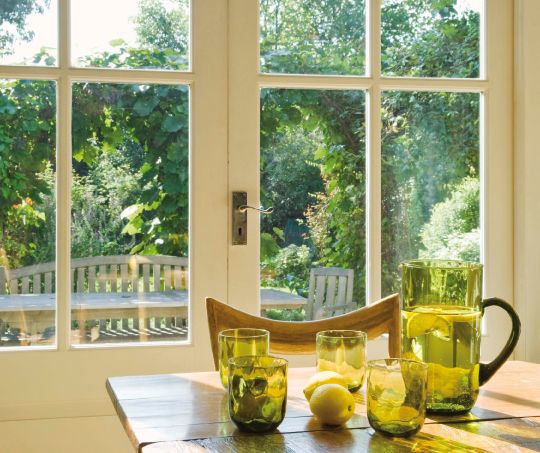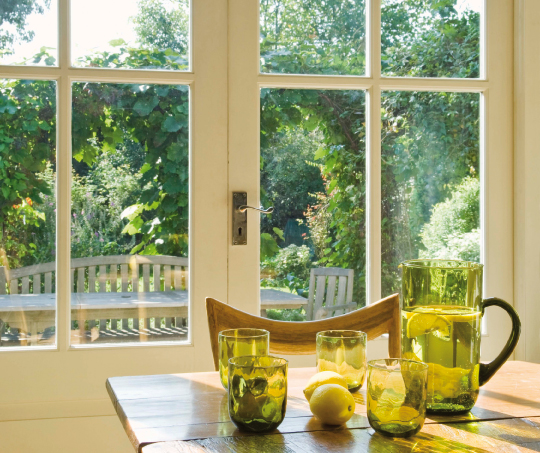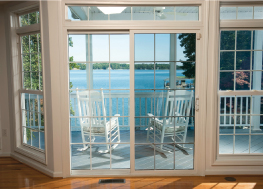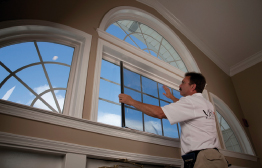Best in Film: A Clear View to Energy Savings Through Windows

 Your home’s windows let in light and offer beautiful views. But the sunlight they invite in can also cause “hot spots” and severe fading of valuable furnishings. And during storms, or in the unfortunate event of a break-in, windows are the most vulnerable points in your home. Window film is designed to repel solar heat, reduce fading in your home, and even add a valuable layer of protection. Best of all, it provides all of these benefits without changing the look of your home.
Your home’s windows let in light and offer beautiful views. But the sunlight they invite in can also cause “hot spots” and severe fading of valuable furnishings. And during storms, or in the unfortunate event of a break-in, windows are the most vulnerable points in your home. Window film is designed to repel solar heat, reduce fading in your home, and even add a valuable layer of protection. Best of all, it provides all of these benefits without changing the look of your home.
“Window film has such an advantage over blinds or curtains,” says Kevin Bingham of Solar Control Films, right here in Roanoke. Bingham has been in business 34 years. “Shades are nice, but they don’t decrease the heat like window film can, and they take away from beautiful views,” he says.
Although natural light is the primary reason we have windows in our homes, the biggest drawback is unfiltered sunlight, which can increase energy bills. During the winter, light doesn’t provide enough heat to make a difference in temperature, while during the summer months, sunlight only increases the amount of heat entering our homes. A new window film product called Interlogic even radiates heat back into the home when it’s needed.
“Everyone wants to save money, and window film makes a huge difference when it comes to energy costs,” says Bingham. His cites one example where his company installed a layer of window film on the SunTrust Plaza in downtown Roanoke. “Before the window film was put in place, the air conditioning unit ran all year-round. Now, the building regulates the temperature properly…20 years after it was built, the HVAC units finally shut off.” Bingham says he’s seen customers save between 20 to 40 percent on energy bills by applying the film. At his own home, Bingham reports a 40 percent drop in his utility costs.
 Transparency in Film
Transparency in Film
Of course, having a “film” on your window implies your windows need cleaning. We all know the phrase, “I don’t do windows!” Well, fear not. Steven Barker of Clear Defense Window Film of Virginia explains that although homeowners may have trepidation about “tinting” their home windows, the application can be perfectly natural, if that’s what they want. “Though the films come in various colors and strengths, most homeowners forget it is even on the windows after a few weeks,” says Barker. “Besides enhancing views and controlling temperature fluctuations, it’s not as noticeable as you would think.”
And the financial benefit of using insulating window film far outweighs the upfront cost to buy and apply the product to your windows. In fact, you can expect to invest only $2 to $3 per square foot for the film, and another $5 to $7 per square foot for the installation. That means that the total cost to buy window film for a 3×7 sliding door would cost approximately $50, with an installation cost of a little more than $100.
Having been in the business more than 12 years, Barker believes that Vista Window Film is the best product on the market. “Being manufactured in Martinsville, under the parent company Solutia, allows better customer support and shipment of products on a very timely basis,” says Barker. “They are a worldwide supplier with small town appeal.” On top of the obvious savings you reap through monthly energy bills, there is also a 30 percent tax credit on the purchase of some window films. Just be sure to check with the film manufacturer to assure that their film meets the requirements of the tax credit. Not all films qualify.
Window film also reduces harmful UV rays from entering your home. This, in turn, can drastically reduce the amount of fading that occurs on flooring, furniture and fabrics. It can also mean a reduced risk of certain skin cancers, if reading by the window is a daily activity. This thin, clear layer of window film also protects you and your family’s safety, in case your windows break due to an attempted break-in, accident or natural disaster. Since a window film is essentially shatterproof, you won’t have to worry about shards of glass flying through a room. Although still broken, glass treated with window film will fall off in one large piece, often even staying inside its pane. “This can be a powerful safety device,” says Bingham. He recounts the story of a woman in Southwest Roanoke County who was cleaning her gun when it accidentally went off. When the bullet hit the window, it broke—but did not shatter into pieces. Only one bullet hole penetrated the glass and the entire window stayed safely inside its frame. “Without the window film, glass would have been everywhere,” says Bingham.
 Withstanding the Test of Time
Withstanding the Test of Time
But before you rush out to your local home improvement store and start sticking polyester sheets to your home, professionals warn this is not a typical do-it-yourself (DIY) project. “There are many DIY kits available to the public,” says Barker. “That being said, it is always best to have a professional install the film. You will not only have the peace of mind that it was professionally installed, but you will also receive a lifetime warranty on residential applications that you cannot get with DIY kits.”
According to Bingham, once the film has been applied, you can clean your windows as you did before. The only restriction is the use of anything abrasive, such as razor blades or scouring pads. But squeegees, paper towels and microfiber cloths with any type of window cleaner are fine to use, and won’t damage the application. If potential pet damage is a concern, take heart: Bingham says, “I’ve only seen one dog in 34 years damage a film job.” Bingham suggests that if you’re fearful a pet is going to ruin your window film, simply apply a thicker, heavier grade. Barker agrees. “I myself have three dogs,” says Barker, “and they have yet to damage the film.”
From energy savings and sun control, to privacy and protection for your family, applying window film to your home can be the most practical, cost-effective way to enhance value and protect your family. Even with a relatively small energy bill, you can recoup the costs over the life of the film. “In all my years of installing films,” says Barker, “most of my customers only call back to have more film installed or…they want it on their new home or business.”
Yes, I do windows! How often have you heard that phrase? But that’s exactly what you should be thinking when it comes to your home. “Window film keeps all the bad elements out,” says Barker, “and all the good elements in.”
Although natural light is the primary reason we have windows in our homes, the biggest drawback is unfiltered sunlight, which can increase energy bills. During the winter, light doesn’t provide enough heat to make a difference in temperature, while during the summer months, sunlight only increases the amount of heat entering our homes. A new window film product called Interlogic even radiates heat back into the home when it’s needed.
“Everyone wants to save money, and window film makes a huge difference when it comes to energy costs,” says Bingham. His cites one example where his company installed a layer of window film on the SunTrust Plaza in downtown Roanoke. “Before the window film was put in place, the air conditioning unit ran all year-round. Now, the building regulates the temperature properly…20 years after it was built, the HVAC units finally shut off.” Bingham says he’s seen customers save between 20 to 40 percent on energy bills by applying the film. At his own home, Bingham reports a 40 percent drop in his utility costs.
 Transparency in Film
Transparency in FilmOf course, having a “film” on your window implies your windows need cleaning. We all know the phrase, “I don’t do windows!” Well, fear not. Steven Barker of Clear Defense Window Film of Virginia explains that although homeowners may have trepidation about “tinting” their home windows, the application can be perfectly natural, if that’s what they want. “Though the films come in various colors and strengths, most homeowners forget it is even on the windows after a few weeks,” says Barker. “Besides enhancing views and controlling temperature fluctuations, it’s not as noticeable as you would think.”
And the financial benefit of using insulating window film far outweighs the upfront cost to buy and apply the product to your windows. In fact, you can expect to invest only $2 to $3 per square foot for the film, and another $5 to $7 per square foot for the installation. That means that the total cost to buy window film for a 3×7 sliding door would cost approximately $50, with an installation cost of a little more than $100.
Having been in the business more than 12 years, Barker believes that Vista Window Film is the best product on the market. “Being manufactured in Martinsville, under the parent company Solutia, allows better customer support and shipment of products on a very timely basis,” says Barker. “They are a worldwide supplier with small town appeal.” On top of the obvious savings you reap through monthly energy bills, there is also a 30 percent tax credit on the purchase of some window films. Just be sure to check with the film manufacturer to assure that their film meets the requirements of the tax credit. Not all films qualify.
Window film also reduces harmful UV rays from entering your home. This, in turn, can drastically reduce the amount of fading that occurs on flooring, furniture and fabrics. It can also mean a reduced risk of certain skin cancers, if reading by the window is a daily activity. This thin, clear layer of window film also protects you and your family’s safety, in case your windows break due to an attempted break-in, accident or natural disaster. Since a window film is essentially shatterproof, you won’t have to worry about shards of glass flying through a room. Although still broken, glass treated with window film will fall off in one large piece, often even staying inside its pane. “This can be a powerful safety device,” says Bingham. He recounts the story of a woman in Southwest Roanoke County who was cleaning her gun when it accidentally went off. When the bullet hit the window, it broke—but did not shatter into pieces. Only one bullet hole penetrated the glass and the entire window stayed safely inside its frame. “Without the window film, glass would have been everywhere,” says Bingham.
 Withstanding the Test of Time
Withstanding the Test of TimeBut before you rush out to your local home improvement store and start sticking polyester sheets to your home, professionals warn this is not a typical do-it-yourself (DIY) project. “There are many DIY kits available to the public,” says Barker. “That being said, it is always best to have a professional install the film. You will not only have the peace of mind that it was professionally installed, but you will also receive a lifetime warranty on residential applications that you cannot get with DIY kits.”
According to Bingham, once the film has been applied, you can clean your windows as you did before. The only restriction is the use of anything abrasive, such as razor blades or scouring pads. But squeegees, paper towels and microfiber cloths with any type of window cleaner are fine to use, and won’t damage the application. If potential pet damage is a concern, take heart: Bingham says, “I’ve only seen one dog in 34 years damage a film job.” Bingham suggests that if you’re fearful a pet is going to ruin your window film, simply apply a thicker, heavier grade. Barker agrees. “I myself have three dogs,” says Barker, “and they have yet to damage the film.”
From energy savings and sun control, to privacy and protection for your family, applying window film to your home can be the most practical, cost-effective way to enhance value and protect your family. Even with a relatively small energy bill, you can recoup the costs over the life of the film. “In all my years of installing films,” says Barker, “most of my customers only call back to have more film installed or…they want it on their new home or business.”
Yes, I do windows! How often have you heard that phrase? But that’s exactly what you should be thinking when it comes to your home. “Window film keeps all the bad elements out,” says Barker, “and all the good elements in.”






